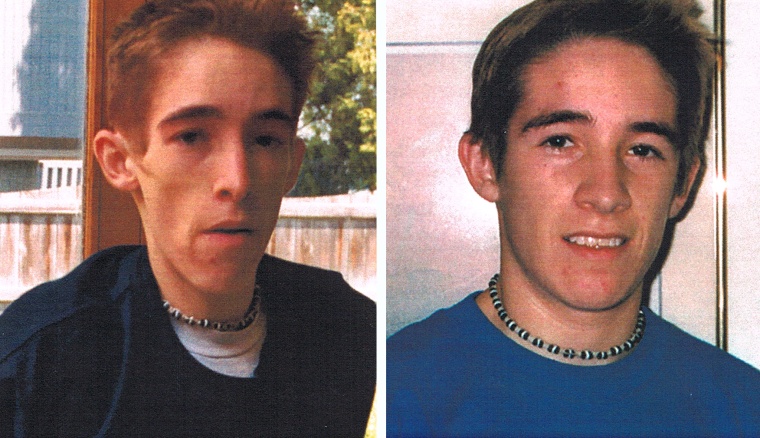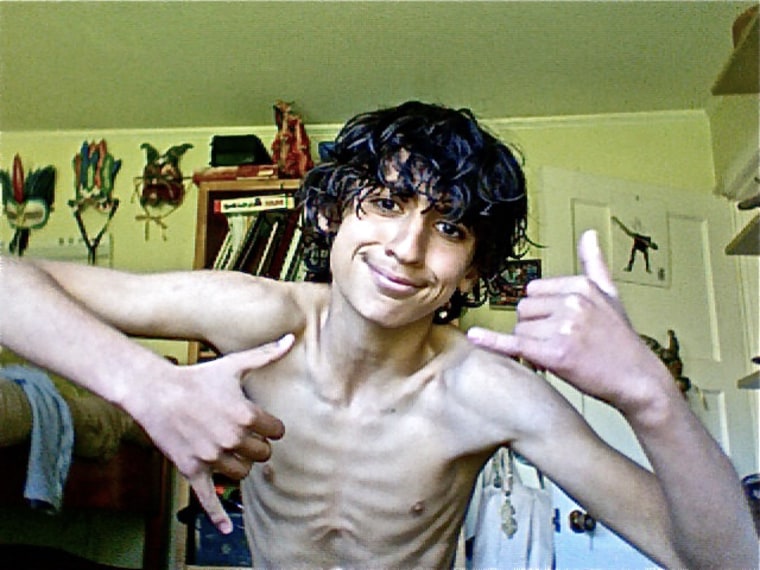By Yardena Schwartz
NBC News
Brick, N.J.: Lindsey Avon and her 28-year-old husband Victor have been together for 10 years. But when Victor decided to lose some weight in college, Lindsey had no idea what he was really going through. It wasn’t until Victor checked himself into an inpatient eating disorder treatment center that Lindsey, 29, realized her then-boyfriend was fatally anorexic.
Santa Cruz, Calif.: Nearly all of Avi Sinai’s school friends were girls, who constantly talked about how “fat” they were and how they longed to be thinner. Avi’s mom and his girlfriends’ mothers were shocked that Avi, just 10 at the time, was the one who succumbed to the obsession with being skinny.
Okemos, Mich.: Susan Barry, 60, spends every day wishing she had known more about male anorexia when her son, TJ Warschefsky, was still alive. He died in 2007 at the age of 22 after an eight-year battle with the disease. His heart gave out in the middle of his nightly routine of 1,000 sit-ups. He weighed 78 pounds.
“He didn’t want to be skinny,” Barry said of TJ, who was a star athlete and straight-A student. “He wanted a six pack, he wanted rock hard abs. That’s how it all started.”

CLICK HERE to view a list of resources for individuals coping with an eating disorder.
Their stories may sound rare, but experts say cases like Avi Sinai, Victor Avon and TJ Warschefsky are growing more and more common. Far from the world of beauty magazines, pin-thin celebrities and runway models, anorexia is striking what many consider to be an unlikely group: boys and young men.
“When the majority of people hear the word anorexia, they automatically assume it’s a girls' disease,” said Victor, who works in his family’s construction business and has since recovered. “The reality of anorexia is that it’s a psychological illness that does not discriminate,” he said.
National Eating Disorders Association
“It appears that the prevalence of the disorder is increasing among boys,” said Dr. James Hudson, a Harvard psychiatry professor who has been treating and researching eating disorders for more than 26 years. “It may be that boys are simply more comfortable coming forward now than in the past.”
In 2007, he was the lead author of a large study on eating disorders in the United States, one of the first of its kind. The study found that one in four people suffering from anorexia or bulimia are male, contradicting prior estimates that only 10 percent of people with eating disorders were male.
The assumption that anorexia can only affect girls and women not only increases the stigma for young men fighting the disease, but it also means that they are often too ashamed to seek help. That leads many to become even sicker than their female counterparts.
“Boys don't get identified,” said Dr. James Lock, a psychiatrist at Lucile Packard Children’s Hospital, where Avi Sinai was hospitalized.
“They come later to treatment,” Lock said. “They have therefore had longer time to lose weight so they're physically sicker. Sometimes that's allowed the psychological processes to be more reinforced in their own thinking and the behaviors.”
On top of those hurdles, most of the resources that exist to help victims of anorexia are largely geared toward females, a fact that amplifies the feelings of isolation among male anorexics. When Victor was first diagnosed with the illness, he tried for months to find information online, but everything he read was tailored to girls and women.
“It made me feel less of a man,” Victor said. “It made me feel broken and defective.”

Victor finally found a treatment program for young men at Princeton University Medical Center, close to his home in Brick, N.J., but others are not as fortunate. When Susan Barry was looking for help for her son TJ, there was not a single residential program in their home state of Michigan that treated boys. It took more than a year for Barry to find an appropriate program for her son, eventually bringing TJ to Rogers Memorial Hospital in Wisconsin, hours away from his family.
It was a similar crisis for Avi, now 14, when his family first sought treatment two years ago.
“It often felt like there wasn’t enough awareness out there to help him,” said Avi’s mother, Nancy, 50, who eventually found a center near their home in Santa Cruz, Calif., that was willing to make room for her son. “If these boys need residential care, which Avi really did, there are hardly any treatment centers that have beds for boys. The beds are reserved for girls and women, and the language is written for females.”
The link between personality and anorexia
According to Lock, it takes a certain kind of personality to develop the illness.
“It's very unusual for someone to come into my office for an assessment of anorexia if they do not have straight A’s,” said Lock. “This is true for boys and this is true for girls. And in sports, these are great athletes, usually, who drive themselves to the next level.”
While boys who participate in sports such as wrestling or track may be more likely to want to lose weight, Lock warned that the desire to enhance athletic performance should not be confused with anorexia. Athletic pressure may increase the motivation to lose weight, he said, but not every elite athlete has an eating disorder.
Barry said her son TJ’s perfectionism and desire for control may have made him more vulnerable to the disease that eventually took his life. Because TJ’s anorexia took over his ability to reason, said Barry, it was impossible for him to recover.
“I think there's a point in this illness where the obsession and the control turns to complete out of control,” she said. “The illness takes control. And they become possessed.”
As baffling as the causes of anorexia may be, so are the factors behind the increase in the disease among boys and young men.
Dr. Jennifer Hagman has been running the eating disorder program at Children’s Hospital Colorado since 1993, where until five years ago, it was uncommon for her to see boy patients. “Now we almost always have one to three boys in the program,” she said. According to Hagman, these boys are victims of society’s obsession with appearance and the increased focus on childhood obesity.
“The emphasis in our culture about eating healthier is no doubt the biggest factor,” she said. “In school they’re telling them to limit the fat in their diet. I hear from many kids in the program that it was after a health class that they started to limit their diets.”
While it is important to educate children to live healthy lives, said Hagman, it is just as important to deliver that message in a balanced way, without triggering unhealthy habits.
For Susan Barry and Nancy Sinai, there is an even more crucial message for parents who think their children may be suffering from an eating disorder.
“Just like cancer or any other disease, early detection is key,” said Susan. She acknowledged treatment wasn’t enough to save TJ from the downward spiral of his disease, but nonetheless, she encourages parents to do whatever they can to find help.
“A lot of parents will say that, ‘Well, your son went to residential treatment. It didn't help him.’” To which Susan tells them, “Think of all the people that are helped in hospitals. But there are several that aren't. You don't not send him to a hospital because some don't make it.”
NBC's Dr. Nancy Snyderman and NBC producer Mary Murray contributed to this report.
If you think that you or a loved one may be suffering from an eating disorder, visit these helpful resources or call the National Eating Disorders live helpline at 800-931-2237 (Monday – Friday: 9 a.m. – 5 p.m. EST)
National Eating Disorders Association: http://www.nationaleatingdisorders.org/
National Association of Anorexia Nervosa and Associated Disorders: http://www.anad.org/
National Association for Males with Eating Disorders: http://namedinc.org/
International Association of Eating Disorders Professionals: http://www.iaedp.com/
Eating Disorders Coalition: http://www.eatingdisorderscoalition.org/
Families Empowered and Supporting Treatment of Eating Disorders: http://www.feast-ed.org/
Eating Disorders Resource Center: http://www.edrcsv.org/